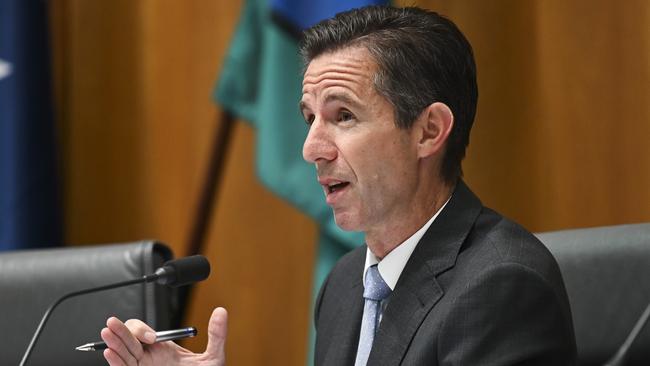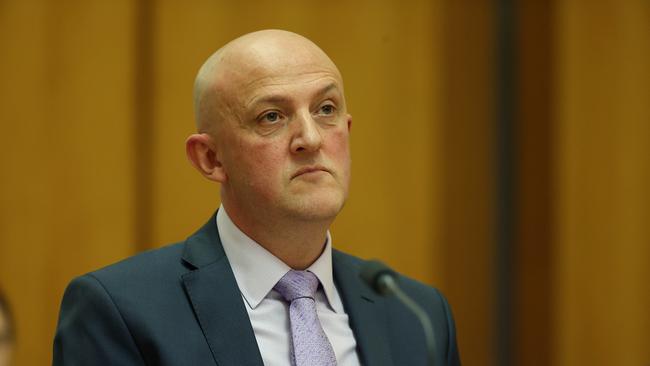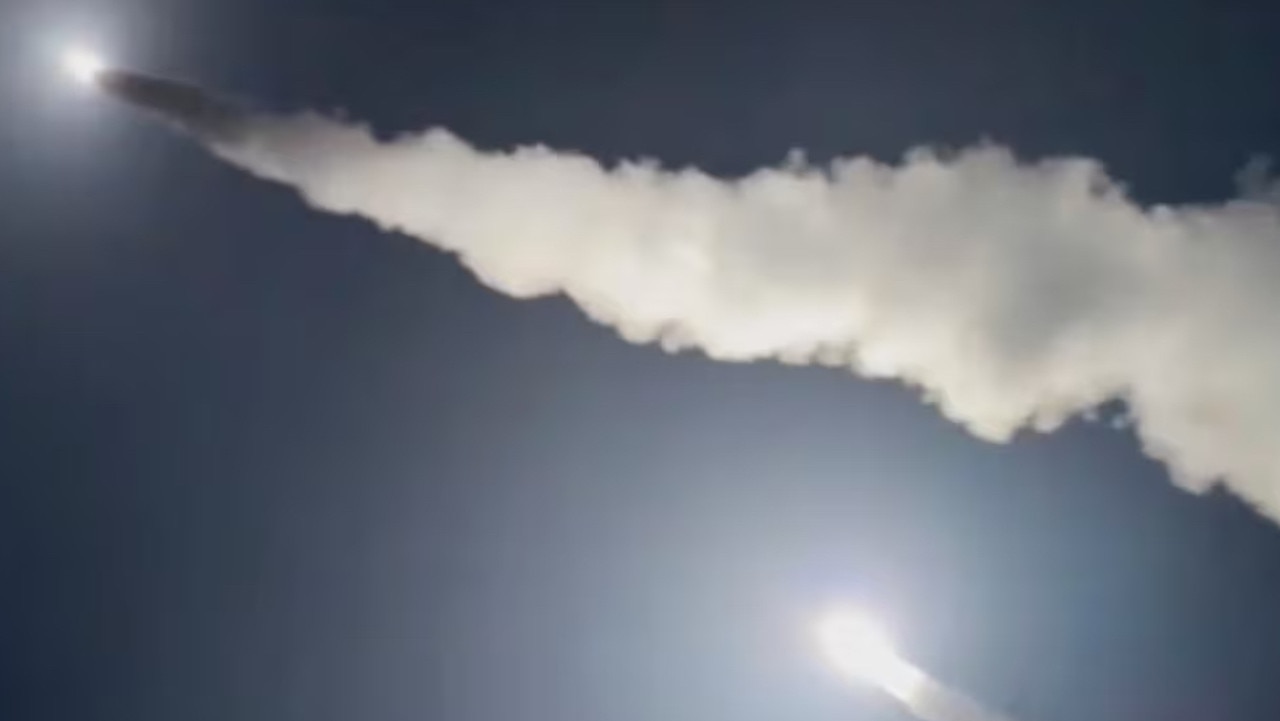ASIO boss Mike Burgess won’t bow to pressure to reveal which former politician ‘sold out Australia’
The boss of Australia’s spy agency has refused to unmask the identity of an ex-politician accused of selling out the nation.

News
Don't miss out on the headlines from News. Followed categories will be added to My News.
The nation’s top spy has called for calm, refusing to name names after dropping a bombshell that a former politician sold out Australia to foreign spies.
Mike Burgess used his annual threat assessment address on Wednesday night to reveal an ex-politician was recruited by a foreign intelligence service “several years ago” but declined to name them.
Former federal treasurer and ambassador to the US Joe Hockey said the claims had implicated hundreds of officials, and said Mr Burgess had a duty to every politician to reveal who it was.
“You can’t make an allegation or a statement about someone being a traitor and then expect that no one will ask questions,” Mr Hockey said on Wednesday.
Former Labor senator Sam Dastyari and former NSW state MP Ernest Wong both publicly denied they were the individual through media on Thursday, while former prime minister Malcolm Turnbull’s son Alex revealed he was the target of suspected agents.
Mr Burgess doubled down on his decision not to name names late on Thursday, saying the case was an “historic matter” and the individual was “no longer of security concern”.
“In accordance with longstanding practice, ASIO will not publicly discuss individuals or provide operational details,” he said in a statement.

Defence Minister Richard Marles had earlier argued that publicly revealing the name of the alleged traitor would not be beneficial.
“I am not aware of the specific facts which underpin the scenario that Mike Burgess has outlined,” he said on Thursday.
“I respect the reasons why that is important to be kept confidential … but I think it is also really important that this story be put out in the public domain, which is what Mike Burgess has done, because, you know, those of us engaged in public life, we need to be really vigilant.”
Opposition leader Peter Dutton had earlier said the accused individual should be “outed and shamed”.
“I haven’t been told [who it is]. Mike Burgess is as good as they get, he’s a great head of the ASIO and he’s really a first class operator,” Mr Dutton told 2GB.
“It’s pretty rough to essentially besmirch former politicians when he’s talking about one and the trouble is if he doesn’t indicate the name then there’s a cloud hanging over everybody else.”

Opposition home affairs spokesperson James Paterson said he had a “fair idea” of who the spy was but refused to speculate publicly.
He agreed with Mr Marles that the accused politician shouldn’t be outed but said the person should face serious legal consequences.
“I think it would be unfair to name someone publicly and you would obviously be running a very serious defamation risk if you do so,” he told reporters on Thursday.
“I think it would be very powerful and important if someone has betrayed their country, particularly someone who has the honour of representing their country in the parliament, that they face legal consequences and very serious ones for that.
“But the reality is the laws weren’t there when this conduct occurred. That makes it very difficult.”

Later, Opposition foreign affairs spokesperson Simon Birmingham demanded that the Albanese government provide “as much clarity of possible” about the reported betrayal citing significant public interest in the matter.
“That public interest deserves to be addressed, as transparently as possible, and Home Affairs should step forward and provide that information, as much of it as possible,” he said.
Mr Burgess had used a major address on Wednesday evening to reveal that a dedicated unit within a foreign spy service is targeting Australia.
He said the “A-team” – a spy network operating within a “particular foreign intelligence service” – had come to be one of the most significant threats the agency was fighting against, speaking about them publicly because “we want the A-team to know its cover is blown”.

Mr Burgess said the A-team trawled professional networking sites looking for Australians with access to high-level security, defence and risk information.
Mr Burgess said the team used “false, anglicised personas”, posing as consultants, headhunters, officials, academics and researchers from fictional companies to approach the targets.
He said they had tried to recruit students, academics, business people, police and public servants across all levels of government.
Even elected officials have fallen for the A-team, with Mr Burgess speaking of one former politician who had been “successfully cultivated and recruited” by the A-team “several years ago”.
“This politician sold out their country, party and former colleagues to advance the interests of the foreign regime,” Mr Burgess said.
“At one point, the former politician even proposed bringing a prime minister’s family member into the spies’ orbit.
“Fortunately, that plot did not go ahead, but other schemes did.”
Mr Burgess did not make clear who the former politician was, or whether they had unwittingly engaged with the A-team or done so deliberately.
In one such other scheme, leading Australian political figures and academics went overseas for an all-expenses paid conference attended by a host of A-team spies purporting to be bureaucrats who built relationships with the Australians and “aggressively targeted” them.
“A few weeks after the conference wrapped up, one of the academics started giving the A-team information about Australia’s national security and defence priorities,” Mr Burgess said.

Another Australian, an aspiring politician, provided insights into the factional dynamics of his party, analysis of a recent election and the names of up-and-comers – presumably so the A-team could target them too.
“ASIO disrupted this scheme and confronted the Australians involved. While some were unwitting, others knew they were working for a foreign intelligence service.”
Mr Burgess said ASIO had helped extract the unaware ones, severed the links between the others and the foreign actors, and added: “several individuals should be grateful the espionage and foreign interference laws are not retrospective”.
Mr Burgess said ASIO confronted the A-team directly online last year.
“The spy was being spied on. The player was being played,” Mr Burgess said.
He said too many Australians were missing the warning signs or were making the A-team’s work “too easy”.
“On just one professional networking site, there are 14,000 Australians publicly boasting about having a security clearance or working in the intelligence community. Some even out themselves as intelligence officers – even while proving they’re not particularly good ones!” he said.
“I appreciate that people need to market themselves but please be smart and be discreet – don’t make yourself an easy target.”
Also during his speech, Mr Burgess made a chilling warning that he feared sabotage – the principal security concerns in the 1950s – could re-emerge, particularly in relation to critical infrastructure.
“There aren’t a lot of things that terrorists and spies have in common, but sabotage is one of them,” he said.
“ASIO is seeing both cohorts talking about sabotage, researching sabotage, sometimes conducting reconnaissance for sabotage – but, I stress, not planning to conduct sabotage at this time.”
He said ASIO was aware of one nation state conducting “multiple attempts to scan critical infrastructure” in Australia and elsewhere, targeting water, energy, and transport energy networks.
Describing the reconnaissance as “highly sophisticated” and a means of mapping out networks and testing digital locks, Mr Burgess said there was a chance the nation could conduct sabotage in the future.
Citing the impact the Optus network outage last year – unrelated to sabotage – had on Australia, Mr Burgess questioned what it would mean for the country if a foreign state “took down all the networks, or turned off the power during a heatwave?”
“I assure you, these are not hypotheticals,” he said.
“Foreign governments have crack cyber teams investigating these possibilities right now, although they are only likely to materialise during a conflict or near conflict.”
More Coverage
Originally published as ASIO boss Mike Burgess won’t bow to pressure to reveal which former politician ‘sold out Australia’



